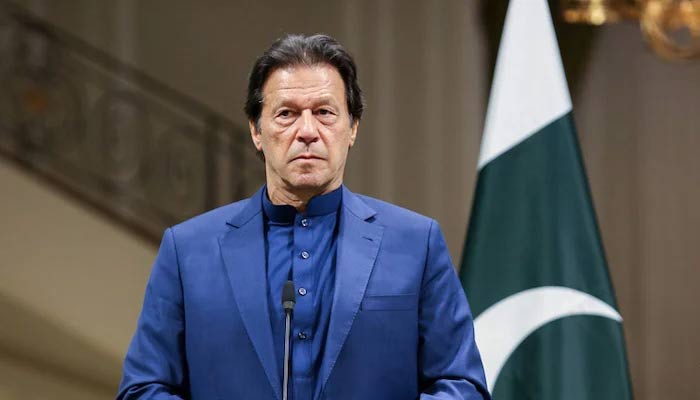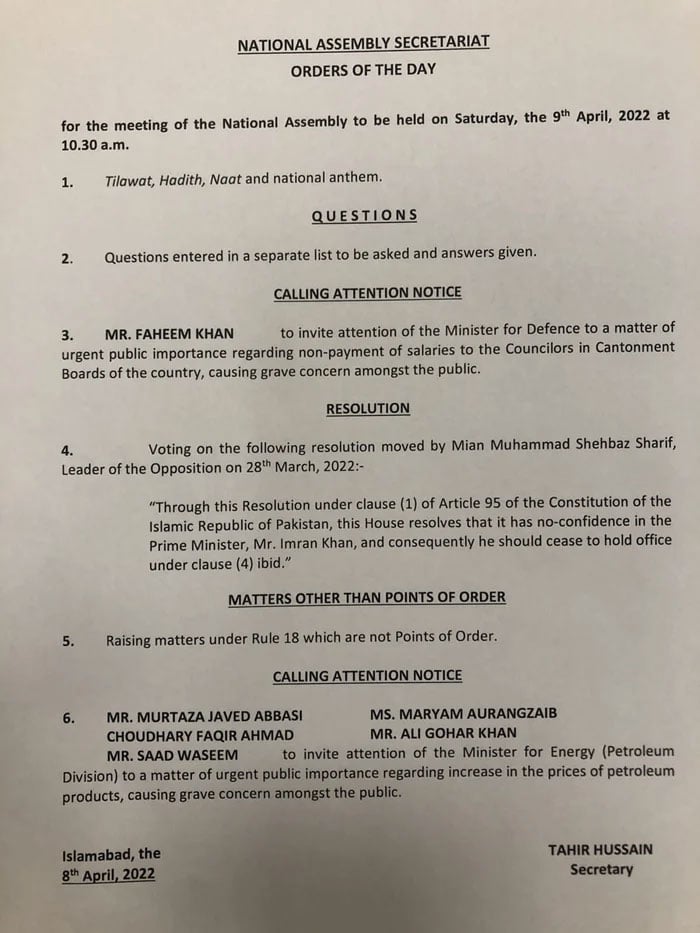NA session summoned for tomorrow to vote on no-confidence motion against PM Imran Khan
NA session summoned in line with Supreme Court's order after SC blocked deputy speaker's ruling to throw away no-trust vote
ISLAMABAD: The National Assembly's session to vote on the no-confidence motion against Prime Minister Imran Khan has been summoned for tomorrow at 10:30am tomorrow (Saturday) as per the Supreme Court's order.
In the National Assembly's (NA) agenda issued Friday, voting on the no-confidence motion is on the fourth position in the six-point agenda.
The top court restored the NA a day earlier after it declared the government's decision to dissolve the assembly and NA Deputy Speaker Qasim Suri's ruling against the Constitution.
The top court has ordered NA Speaker Asad Qasier to summon the session on Saturday (April 9) no later than 10:30am to allow the vote on the no-confidence motion against the premier.
The Supreme Court also "declared that the assembly was in existence at all times, and continues to remain and be so".
The apex court also stated that the speaker cannot prorogue the assembly and bring the session to an end if the no-trust motion fails or after a new prime minister is elected if a no-confidence motion is passed.
The court ruled that no member will be barred from casting their vote. It also stated that if the no-trust motion fails, then the government will continue to carry out its affairs.
"...if the no-confidence motion against the prime minister succeeds, then the assembly will appoint the new prime minister," the top court's order said.
'Mass resignations'
Interior Minister Sheikh Rasheed — who was restored as a cabinet member after the Supreme Court's landmark judgement — has said mass resignations from the treasury benches could resolve the current political turmoil.
"I used to suggest three months back: tender your resignations, dissolve the assemblies, impose an emergency, impose governor's rule. I was right in all instances," the interior minister told journalists in the federal capital.
"I stand by my decision of mass resignations. We should take to the streets and expose these hired guns [the Opposition]. They will [compromise] on Pakistan's foreign policy," the interior minister said.
PM to address nation
Despite being clean bowled by the Supreme Court's judgement, giving the PTI-led government a major setback, PM Imran Khan has pledged to fight for Pakistan "till the last ball."
To review the latest situation, the prime minister has called a federal cabinet meeting today — which started at 2pm — after almost a month's hiatus, while he will also chair a meeting of the PTI's parliamentary party later in the day.
"I have called a cabinet mtg tomorrow as well as our parliamentary party meeting, and tomorrow evening I will address the nation," the prime minister said in a tweet after the order was issued.
"My message to our nation is I have always and will continue to fight for Pakistan till the last ball," PM Imran Khan said.
Lost majority
PM Imran Khan's coalition lost its majority in the national assembly last week, but he avoided being dismissed when the deputy speaker blocked a no-confidence motion against him and the president dissolved parliament and ordered fresh elections.
The premier claimed the Opposition had colluded with the United States for "regime change" when the deputy speaker — a member of PTI — refused to allow the no-confidence motion.
Simultaneously, Khan asked President Arif Alvi — who is also a PTI loyalist — to dissolve the assembly.
The decision — which the court said was unanimous — was met with jubilation by opposition supporters in the capital, with packed cars racing through the streets, sounding their horns.
There had been high hopes for Khan when he was elected in 2018 on a promise of sweeping away decades of entrenched corruption and cronyism, but he struggled to maintain support with soaring inflation, a feeble rupee and crippling debt.
-
Security forces gun down 30 terrorists in multiple IBOs in KP: ISPR
-
MQM-P calls for new province in Sindh
-
US report validates Pakistan military edge over India: PM
-
Banned TTP poses serious threat to Pakistan security: UNSC panel
-
CM Afridi clarifies remarks on by-poll after ECP requests army deployment
-
Dubai sees 3.2m Pakistani passengers in 2025 as airport sets new milestone
-
Security forces kill 23 Indian proxy terrorists in KP's Kurram
-
Pakistan to construct island to boost oil exploration: report













